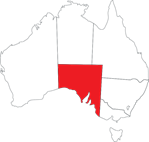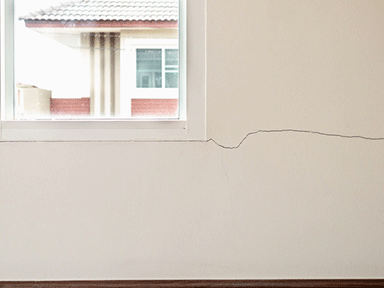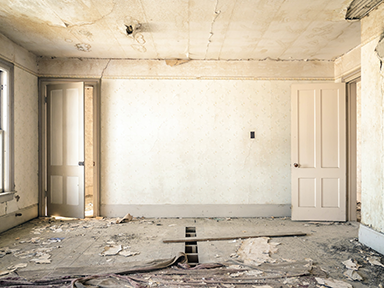When your rental suffers damage, some repairs are considered ‘urgent’. And urgent repairs must be completed within legislated timeframes. If they don’t happen, you could put your landlord insurance in jeopardy and end up in legal hot water. Read on to find out why.
Damage at a rental can and does occur, just like at any other property. It could be caused by many things including the wrath of Mother Nature, an unforeseeable event like a car ploughing through the front room, an accident like a child’s ball smashing a window, or by malice, for example, a tenant punching a hole in the wall.
While all damage will need to be repaired at some stage, some repairs are considered ‘urgent’ or ‘emergency’. And these repairs need to be completed within legislated timeframes. The reason is quite simple, it is because the nature of the damage is such that it makes the premises unsafe or uninhabitable.
So, what is an 'urgent repair'?
An urgent repair generally refers to any issue that threatens a property's structural integrity, poses a risk to lives, makes a property unsafe or not secure, or prevents access to essential services.
What is an urgent repair varies from state-to-state. The residential tenancy legislation in each state identifies repairs which must be undertaken and provides a timeframe for completion. Landlords (and their agents) can find themselves in a lot of bother with the authorities if they fail to meet those repair obligations.
In most jurisdictions, the tenancy law will also provide for tenants to arrange urgent repairs and recoup the costs if the landlord or agent does not arrange the repairs within the timeframe.
So, if your rental suffers damage, it is a good idea to know what is considered an urgent repair and how long you have to complete it. Check out our state-by-state rundown below on urgent repairs.
But, before we get into it, we want to highlight the impact on landlord insurance. While it is not only important to ensure urgent/emergency repairs are made within legislated timeframes to protect your tenants and avoid strife with the authorities, it also helps to safeguard your landlord insurance.
It is a condition of cover that the landlord (and their agent) must act lawfully. This means you must comply with all applicable laws, including rules relating to repairs. If you fail to meet your legal obligations, any claim you make on your policy can be jeopardised.
Another condition of cover is ensuring that the premises are adequately maintained. If an urgent repair is not made, it is unlikely that the maintenance condition will be met. So, if the rental is not maintained, the insurance on the property can be impacted.
Good to know: When it comes to urgent/emergency repairs, EBM RentCover policyholders do not need to get our prior permission to proceed with the repairs. You can arrange for any necessary urgent repairs to be undertaken to ensure the safety of the premises and your tenants. You will need to keep all tax invoices/receipts for the repairs to submit as part of your insurance claim. You will, however, need to get permission before arranging any repairs or replacements that are not urgent/emergency.
If you have questions about urgent repairs and your landlord insurance, please get in touch with a member of our Expert Care team – 1800 661 662.
State by state rundown on urgent repairs
Note: This information is provided as a guide only and should not be relied upon. Landlords and agents should refer to the current residential tenancy act or tenancy authority in their jurisdiction for the most up-to-date information.
Western Australia
Urgent repairs
Urgent repairs fall into two categories: essential services and other urgent repairs.
Essential services are listed in the Residential Tenancies Regulations 1989 and include repairs to fix:
-
a burst water service;
-
gas leaks;
-
broken hot water system;
-
sewerage leaks; or
-
dangerous electrical faults.
Other urgent repairs are not an essential service but, if not fixed, might cause damage to the premises, injure a person or cause undue hardship or inconvenience to the tenant.
Timeframe
Once a tenant notifies the landlord/agent of the need for an urgent repair, the landlord/agent must take action to contact a suitable repairer and arrange for them to fix the problem:
-
Essential service – the landlord/agent has 24 hours to contact a suitable repairer.
-
Other urgent repairs – the landlord/agent has 48 hours to contact a suitable repairer.
Note: A suitable repairer is someone who is suitably qualified, trained or licensed to undertake the necessary work (e.g. a licensed electrician or licensed plumber).
The repair does not need to be fixed within this time, but the landlord/agent must make an appointment with the repairer to fix the problem. The landlord/agent must then ensure the repairs are carried out as soon as practicable after the arrangements have been made.
Northern Territory
Emergency repairs
Emergency repairs are outlined in the Residential Tenancies Act 1999. An emergency repair is any work to fix:
-
a burst water service;
-
a blocked or broken toilet;
-
a serious roof leak;
-
a gas leak;
-
a dangerous electrical fault;
-
flooding or serious flood damage;
-
serious storm, fire or impact damage;
-
a failure or breakdown of the gas, electricity or water supply to the premises;
-
a failure or breakdown of any essential service on the premises for hot water, cooking, heating or laundering;
-
any fault or damage that causes the premises to be unsafe or not secure;
-
fault or damage that can likely injure a person, damage property or inconvenience the tenant; or
-
a serious fault in a staircase or lift or other area that inconveniences the tenant in gaining access or using the premises.
Timeframe
Once the landlord/agent has been notified of the need for an urgent repair, the landlord/agent has five days to either:
-
make repairs to the property; or
-
arrange for repairs to be made within 14 days.
South Australia
Urgent repairs
The Housing Improvement Act 2016 sets minimum standards for a rental property. If the property does not meet the standards, tenants can request an urgent repair to ensure compliance.
A state of disrepair (i.e. requiring urgent repair) is one which is likely to result in personal injury or damage to property or undue inconvenience for the tenant. For example, an urgent repair would include things such as a gas leak, burst water service, dangerous electrical faults or anything that makes the property unsafe or not secure.
No further guidance is provided.
Tasmania
Urgent repairs 
The Residential Tenancies Act 1997 notes that an urgent repair is required when an essential service stops working, which is any of the following:
-
water;
-
sewerage;
-
removal of wastewater from kitchen, bathrooms and laundries;
-
the supply of electricity;
-
heating;
-
cooking stove; or
-
hot water service.
Timeframe
Once the landlord/agent has been notified of a need for an urgent repair, the landlord/agent has 24 hours to arrange the repair. The repair must then be carried out as soon as practicable.
Emergency repairs
Emergency repairs are required when the property is damaged, and the damage will get worse if the repair is not completed as soon as possible. For example, a window is broken in a storm and the property will become more damaged if the window is not fixed as soon as possible.
Timeframe
Once the landlord/agent has been notified of the need for an emergency repair, the landlord/agent must ensure the repair is carried out as soon as practicable.
Victoria
Urgent repairs 
The Residential Tenancies Act 1997 notes an urgent repair is required for:
-
burst water service;
-
blocked or broken toilet system;
-
serious roof leak;
-
gas leak;
-
dangerous electrical fault;
-
flooding or serious flood damage;
-
serious storm or fire damage;
-
an essential service or appliance for hot water, water, cooking, heating, or laundering is not working;
-
gas, electricity or water supply is not working;
-
a cooling appliance or service provided by the rental provider is not working;
-
the property does not meet minimum standards;
-
a safety-related device, such as a smoke alarm or pool fence, is not working;
-
an appliance, fitting or fixture that is not working and causes a lot of water to be wasted;
-
any fault or damage in the property that makes it unsafe or insecure, including pests, mould or damp caused by or related to the building structure; or
-
a serious problem with a lift or staircase.
Timeframe
Once notified of the need for an urgent repair, the landlord/agent must make urgent repairs immediately.
Australian Capital Territory
Urgent repairs 
The Renting Handbook notes urgent repairs include works to repair:
-
a burst water service;
-
a blocked or broken toilet;
-
a serious roof leak;
-
a gas leak;
-
a dangerous electrical fault;
-
flooding or serious flood damage;
-
serious storm or fire damage;
-
a failure of gas, electricity or water supply to the property;
-
a failure of any refrigerator or laundry appliance supplied with the property, or any service for hot water, cooking, heating or cooling;
-
any fault or damage that makes the property unsafe or insecure, or is likely to cause injury to person or property; or
-
a serious fault in any door, staircase, lift or other common area that prevents (or causes undue inconvenience to) the tenant accessing or using the property.
Timeframe
There is no fixed timeframe within which an urgent repair must be completed. The landlord/agent must carry out an urgent repair as soon as necessary, having regard to the nature of the problem.
New South Wales
Urgent repairs 
The Residential Tenancies Act 2010 notes that an urgent repair means works to repair:
-
a gas leak;
-
a dangerous electrical fault;
-
flooding or serious flood damage;
-
serious storm or fire damage;
-
a failure or breakdown of the gas, electricity or water supply to the property;
-
a failure or breakdown of any essential service for hot water, cooking, heating, cooling or laundering;
-
a fault or damage which makes the property unsafe or unsecure;
-
a burst water service;
-
an appliance, fitting or fixture that uses water or is used to supply water that is broken or not functioning properly, so that a substantial amount of water is being wasted;
-
a blocked or broken toilet; or
-
a serious roof leak.
Note: Ensuring smoke alarms are working is also considered 'urgent', but there are different rules about their repair.
Timeframe
Once the landlord/agent has been notified of the need for an urgent repair, the landlord/agent should arrange the repair within a reasonable timeframe.
Queensland
Emergency repairs 
Emergency repairs are defined in the Residential Tenancies and Rooming Accommodation Act 2008. Emergency repairs are works to repair:
-
a burst water service or a serious water service leak;
-
a blocked or broken toilet;
-
a serious roof leak;
-
a gas leak;
-
a dangerous electrical fault;
-
flooding or serious flood damage;
-
serious storm, fire or impact damage;
-
a failure or breakdown of the gas, electricity or water supply;
-
a failure or breakdown of an essential service or appliance on the premises for hot water, cooking or heating;
-
a fault or damage that makes the premises unsafe or unsecure (this includes smoke alarms);
-
a fault or damage likely to injure a person, damage property or unduly inconvenience a tenant;
-
a serious fault in a staircase, lift or other common area of the premises that unduly inconveniences a tenant in gaining access to, or using, the premises; or
-
failure to meet minimum housing standards – only effective once minimum housing standards apply to the property. Minimum housing standards came into effect for new tenancies (including renewed tenancy agreements) from 1 September 2023 and commence for all remaining tenancies on 1 September 2024.
Timeframe
Emergency repair details must be included in the tenancy agreement. The tenancy agreement must also state if the nominated repairer or the landlord/agent should be the first point of contact for emergency repairs. Once the landlord/agent has been notified of the need for an emergency repair, the landlord/agent should arrange the repair within a reasonable timeframe.
Again, if you have any questions about urgent repairs and how it impacts cover, contact the EBM RentCover team on 1800 661 662.
*While we have taken care to ensure the information above is true and correct at the time of publication, changes in circumstances and legislation after the displayed date may impact the accuracy of this article. If you need us we are here, contact 1800 661 662 if you have any questions.
You may also like
View all
If you own an aging rental property, here are the tips to help avoid gradual disaster...

Damage is damage, right? Well, not when it comes to insurance...

When money is tight, eventually something might have to give. And for tenants, that something may just be the rent payment...




